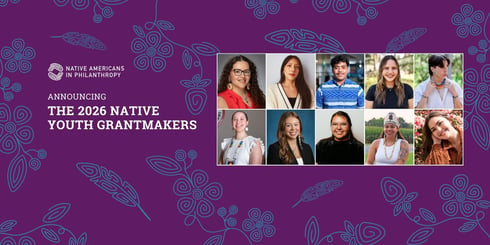Here’s What You Can Do to Honor National Day of Remembrance for U.S. Indian Boarding Schools
Here’s What You Can Do to Honor National Day of Remembrance for U.S. Indian Boarding Schools
National Day of Remembrance for U.S. Indian Boarding Schools, also known as Orange Shirt Day, is a day to honor the victims and survivors of the 367 boarding schools in the United States.
Canada will also be honoring the first National Day of Truth & Reconciliation on the same day. Canada was home to 139 federally-run residential schools.
Today, we at Native Americans in Philanthropy are making a call to stand with us and our relatives across Turtle Island as we work toward healing from the long-lasting effects of the boarding and residential school systems.
Philanthropic leaders have engaged with this issue, and at Native Americans in Philanthropy, we’ve been listening to our partners, colleagues, and collaborators about some of the greatest needs in this moment of solidarity.
SUPPORT COMMUNITY EVENTS
Tribal communities, Native-led groups, and allies are planning events to honor our boarding school survivors and call for accountability. Here are just a few:
Orange Shirt Day: The Boarding School Era and Watch Party of Unspoken - Virtual – 10:00am to 8:00pm CDT - Hosted by: Lac Courte Oreilles Ojibwe College Extension
Orange Shirt Day Event – Virtual – 2:00pm to 3:30pm EDT - Hosted by University of Toronto HartHouse
Orange Shirt Day Event: Justice and Awareness for Indigenous Peoples Impacted by Residential Schools – Boston, MA – 4:30pm to 6:00pm EDT - Hosted by North American Indian Center of Boston
Orange Shirt Day Event - Carson City, NV - 5:00pm PDT - Hosted by: AIM Northern Nevada and Stewart Indian School
EDUCATE YOURSELF ON THE TRUTH
The vast majority of Americans didn’t grow up learning about the tragedies of Indian boarding schools, but Native leaders and educators are seeking to change that so the full scope of the wrongs inflicted upon Tribal communities can be fully understood.
Boarding and residential schools were born out of the belief that Indigenous cultures were to blame for Native peoples’ refusal and/or inability to integrate into mainstream society. The thought was to “kill the Indian, save the man” by forcibly assimilating Native children. This process began with children separated from their families and communities against their will, then transporting them to faraway and isolated boarding and residential schools where all Indigenous cultural and religious practices were forbidden in order to convert them to Christianity.
Boarding and residential schools were infamous for their violent policies and practices. Examples of their brutality include forcing Christian or American names onto the children, cutting Indigenous children’s hair, withholding food and water, or using physical abuse as punishment, just to name a few.
Many children died while under the ‘care’ of these boarding and residential schools. At the time of writing, 6,509 Indigenous children have been exhumed from school cemeteries and mass graves.
To learn more about the history and realities of the boarding and residential schools, we encourage you to visit the National Native American Boarding School Healing Coalition’s educational resources.
APPLY YOUR KNOWLEDGE & UNDERSTAND THE EFFECTS
Early in summer 2021, 215 children’s bodies were recovered from an unmarked mass grave at the Kamloops Residential School. For many, this was their first experience engaging in this conversation. The sad reality is, stories like these are sure to follow. The future uncovering of children’s bodies, mass graves, and other disturbing findings of atrocities are inevitable. There are over 500 of these sites in the US and Canada and children were taken from over 600 Tribal Nations. Our own CEO, Erik Stegman, outlined the effects attending one of these boarding schools had on his own grandfather.
NAP’s Brittany Schulman, Director of Indigenous Knowledge and Power Building Networks, advises us to not downplay the deep pain and sadness communities are feeling as we process what has happened and try to make sense of our collective responsibility.
"The burden on our communities to educate the public is too heavy and ultimately, is not our responsibility, especially as we have told these heartbreaking personal stories for many years without acknowledgment. Our relatives may now have recognition in mainstream media, but we have long mourned our children and the disruption to our family systems which continues to have consequences to this day. Every child found is a beloved part of our community, and they were tragically never afforded the right to their life. Some of our children never came home, and we, as Indigenous peoples, feel each loss deeply. The governments of Canada and the United States need to continue to prioritize the truth of our children's kidnapping, neglect, and ultimate murder at the hands of the state to begin the journey of collective healing for our nations. Only once we have acknowledged our collective sorrow and the complicity of our governments in the continued genocide of Indigenous peoples can we ensure that this atrocity never happens again in any form."
For more information on how to better understand the historical trauma of boarding and residential schools, please visit the Historical Trauma page on the National Native American Boarding School Healing Coalition website.
Also, please sign up for the Native Americans in Philanthropy ENews to hear about our upcoming event in partnership with the National Native American Boarding School Healing Coalition.



Comments